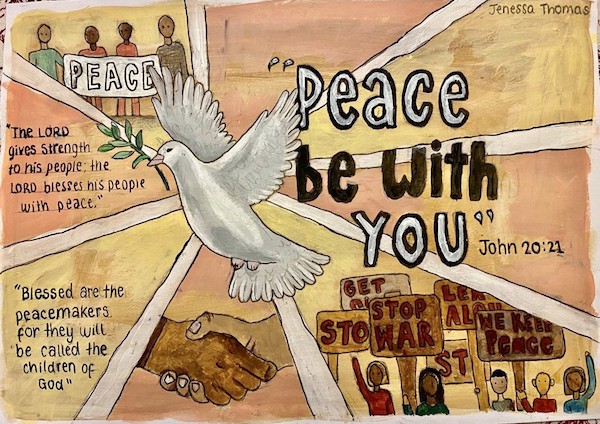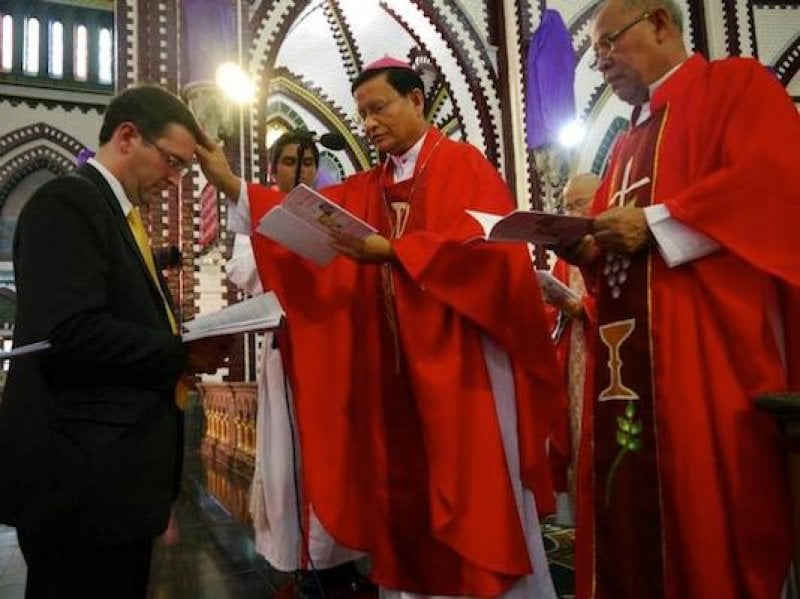Yesterday I celebrated Palm Sunday in Sacred Heart Cathedral in India’s capital, New Delhi, exactly ten years to the day since I was received into the Church in St Mary’s Cathedral in Myanmar’s capital, Yangon. I can no longer travel to Myanmar, as a result of the military coup two years ago which plunged the country into a new era of brutal repression, civil war and humanitarian crisis, but neighbouring India brings me as close as I can get to the country where my journey into the Church began. As we sang Kyrie Eleison, Christe Eleison (“Lord have mercy, Christ have mercy), I prayed for mercy for the people of Myanmar who are suffering such horrific atrocities today, and for justice, freedom and peace.
Just two days earlier, I had the privilege of meeting His Holiness the Dalai Lama at his residence in Dharamsala, where I presented my new book, The China Nexus: Thirty Years In and Around the Chinese Communist Party’s Tyranny. Just standing in the presence of one of the world’s most respected spiritual leaders, and most courageous voices for freedom, justice and peace, was an encounter I will always treasure. When we shook hands, he lifted my hand to his head and I bowed to him, our heads touching in a moment of both profound respect and intimate solidarity. The day I met the Dalai Lama happened to be the 64th anniversary of his safe arrive in India, on 31 March 1959, following his escape from the Chinese People’s Liberation Army (PLA) after they had invaded Tibet.
It is around such themes – of freedom, justice and peace and my work in solidarity with people in places of conflict, repression and persecution – that my spiritual journey has been shaped. Two years before I was received into the Church by the Archbishop of Yangon and Myanmar’s first-ever Cardinal Charles Bo, he and I had an unexpected conversation in his residence over dinner which changed the course of my life.
My journey began more out of curiosity than intention. I became a Christian as a university undergraduate in 1994 and worshipped in evangelical Anglican churches for 19 years. Over those years I came to work with Catholics around the world and formed particularly close friendships with heroes of the faith such as Shahbaz Bhatti in Pakistan, who was later assassinated in 2011, a remarkable nun in East Timor called Sister Lourdes, and many others. However, while I had long ago developed a deep respect for the Catholic Church through Catholic friends I knew, I was perfectly happy where I was as an Anglican.
But that night in Yangon, I asked Cardinal Bo a simple question, out of interest: “If someone who is already a Christian of another tradition wanted to become a Catholic, what would they do?” I was anticipating it to involve a long process, perhaps quite bureaucratic and complicated, but instead the answer he gave was both simple and yet profound. “When a person can accept the teachings of the Catholic Church, they’re ready to become a Catholic,” said Cardinal Bo. He then added something I did not expect: “If you ever find yourself in that position, I would receive you into the Church in Myanmar.”
That had two effects on me. First, I thought what a beautiful invitation, not least because of my long association with Myanmar and its struggle for freedom. And second – if I wanted to take the invitation seriously, even if in the end I did not take it up, I needed to investigate this more seriously. I knew that my friendship with one particular archbishop was not a good enough reason alone to become a Catholic – I needed to go on a journey of exploration.
Ben Rogers with the Dalai Lama
That journey ended up taking two years, and involved a wide-range of reading, from papal encyclicals from 1889 onwards to the entire Catechism of the Catholic Church cover-to-cover and the Compendium of the Social Doctrine of the Church. I fell in love with the works of Hans Urs von Balthazar, Thomas Merton, GK Chesterton, Malcolm Muggeridge, George Weigel, and I found Scott Hahn’s books particularly helpful, given his own journey from evangelical Christianity to Catholicism. I drew particular inspiration from Pope Benedict XVI’s writings, and from the life of Pope St John Paul II. I had Catholic friends who were patient and gracious enough to answer lots of awkward questions, and a parish priest who guided me along the path. The journey culminated – before my baptism – in an Ignatian retreat at Campion Hall, Oxford which was a formative moment.
At a certain moment everything fell into place and I knew that I was meant to accept Cardinal Bo’s invitation, and so I said to him, “If your invitation is still open, I am ready.” Lord Alton agreed to accompany me to Myanmar, to stand alongside me as my sponsor and godfather, and Cardinal Bo offered Palm Sunday 2013 for the occasion. Although I thought having the name Benedict meant I already had a great saint and 16 Popes on my side, I chose Cardinal Bo’s saint, St Charles Borromeo, as my new patron saint, out of respect for the man who inspired me into the faith.
On Palm Sunday ten years ago, friends from a wide variety of backgrounds came to join the celebration, including some who had never set foot in the cathedral in Yangon before. I have always treasured inter-faith friendships and inter-faith collaboration, and have always defended freedom of religion or belief for everyone, of all faiths and none. I am constantly motivated by the works of former Chief Rabbi Lord Jonathan Sacks, who emphasised the importance of what he called in the title of one of his books “The Dignity of Difference”. So I was thrilled when Myanmar Buddhist and Muslim friends, as well as Christians from Protestant traditions, diverse ethnic groups and several foreign friends, including some lapsed Catholics who had not been to Mass for many years, joined me.
When my journey began, I had thought I was coming into the Church under Benedict XVI, but about six weeks before my baptism he shocked the world by becoming the first pope in 600 years to resign. Pope Francis was elected just 11 days before I came into the Church, and so my first decade as a Catholic has been intertwined with Francis’ papacy.
And I have never once looked back or had any regrets. I feel at home in the Catholic Church. I have drawn from the rich variety of spiritual traditions, staying in Benedictine monasteries, learning from Dominicans, speaking to Opus Dei, being inspired by Carmelites and befriended by Salesians. I have a Jesuit spiritual director and have made several Ignatian retreats, so am pleased that we have our first ever Jesuit pope, whose emphasis on mercy, epitomised by a Jubilee Year of Mercy in 2016, and focus on reaching out to the “peripheries” of the world – which led to the appointment of Cardinal Bo and other cardinals from smaller, poorer countries in the developing world – strikes a chord with me.
Pope Francis’ defence of justice, the poor and the marginalised is inspiring. Hardly a Sunday goes by, after praying the Angelus, when he does not speak about one conflict or injustice in one part of the world or another. He has regularly spoken out for Myanmar, for example, and especially for the Rohingyas. Since the coup, Pope Francis has continued to show a particular concern, last year holding a dedicated Mass for the Myanmar community in Rome. In 2018 he became the first pope ever to visit Myanmar. I was privileged to be in the country for his visit, whose motto was “Love and Peace” – a message Myanmar, and the world today, so desperately needs to hear.
If there is one sadness and area of genuine incomprehension for me, it is in the Vatican’s China policy, which I have now written about many times. I did not come into the Church to seek an argument with the Vatican, and I only started speaking out on the Vatican’s China deal with a heavy heart and great reluctance. But given how outspoken Pope Francis is on so many other injustices, his near-total silence on the genocide of the Uyghurs, the persecution of Christians and Falun Gong in China, forced organ harvesting, the dismantling of Hong Kong’s freedoms and the atrocities in Tibet troubles me deeply. He is the first Pope in the past four decades not to meet His Holiness the Dalai Lama. And the Vatican’s lacklustre response to the arrest of Hong Kong’s courageous Cardinal Joseph Zen last year was heartbreaking. Having said that, I was pleased to see Pope Francis meet Cardinal Zen at Benedict XVI’s funeral, and the Vatican call out Beijing’s breach of their agreement on the appointment of bishops, so perhaps there are some small signs of hope that the Vatican is waking up to the dangers China’s regime poses.
Holding my palm in the cathedral in Delhi this morning, I reflected on these past ten years. Even though I could not be in Myanmar, I was happy to be as close as I could be physically to the country I love, where my Catholic journey began. And wherever I am, I am spiritually always close to the people of Myanmar in my heart. I also carry the peoples of China, Hong Kong, Tibet, the Uyghurs and North Korea in my heart every day. As we begin Holy Week, I look forward to journeying through the Lord’s Passion, spiritually but also with those around the world who are living through their own Calvary and Golgotha, carrying their own cross. In my work, I believe I am called to help them carry their cross and help tell the world about them. I do so in the knowledge of the resurrection, and the hope that Easter will come for us all.
Benedict Rogers is a human rights activist and writer. He is the co-founder and chief executive of Hong Kong Watch and Senior Analyst for East Asia at CSW. He is the author of seven books, and his faith journey is told in his book “From Burma to Rome: A Journey into the Catholic Church” (Gracewing, 2015). His new book, “The China Nexus: Thirty Years In and Around the Chinese Communist Party’s Tyranny,” was published in 2022 by Optimum Publishing International.




 Loading ...
Loading ...
What do you think?
You can post as a subscriber user ...
User comments (0)